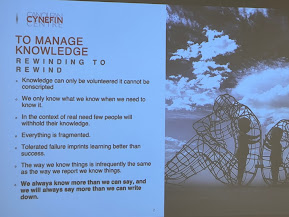Artificial Intelligence For Everyone Has Arrived! What Does That Mean For Knowledge Management?

Anyone who has been following the discussions in Internet tech forums this week gets the unmistakable feeling that we are currently experiencing a qualitative transition, from a yesterday in which artificial intelligence (AI) was either a thing of the future or worked in secret behind specialized systems (Google Auto-Complete or error-prone Tesla Autopilots), and a today in which the technology is suddenly available to all Internet users at the push of a button for a wide variety of tasks and queries. Change happens, as Hemingway put it, "first gradually, then suddenly." We are experiencing just such a sudden moment. But why am I writing this here in a knowledge management column? Let's first take a step back: What is knowledge management fundamentally about? Knowledge should be collected, managed and used within an organization. And users within this organization should be able to access relevant knowledge and information quickly and easily. All with the goal of facil...

